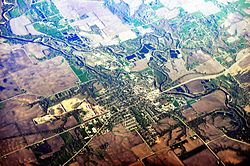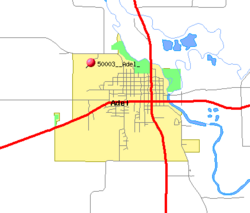Adel, Iowa
Adel, Iowa | |
|---|---|
 Aerial view of Adel | |
 Location of Adel, Iowa | |
 Detailed map of Adel | |
| Coordinates: 41°36′36″N 94°00′45″W / 41.61000°N 94.01250°W | |
| Country | |
| State | |
| County | Dallas |
| Incorporated | 1847 |
| Government | |
| • Type | Mayor-council government |
| • Mayor | Jim Peters |
| Area | |
| • Total | 5.36 sq mi (13.88 km2) |
| • Land | 5.34 sq mi (13.83 km2) |
| • Water | 0.02 sq mi (0.05 km2) |
| Elevation | 892 ft (272 m) |
| Population (2020) | |
| • Total | 6,153 |
| • Density | 1,152.25/sq mi (444.90/km2) |
| Time zone | UTC-6 (Central (CST)) |
| • Summer (DST) | UTC-5 (CDT) |
| ZIP code | 50003 |
| Area code | 515 |
| FIPS code | 19-00505 |
| GNIS feature ID | 2393882[2] |
| Website | adeliowa.org |
Adel (/ˈeɪdəl/ AY-dəl) is a city in and the county seat of Dallas County, Iowa.[3] It is located along the North Raccoon River. Its population was 6,153 at the time of the 2020 Census.[4]
History
[edit]Adel is the oldest town within Dallas County.[5] Originally called Penoach, Adel was incorporated in 1847, and changed to its current name in 1849. In 1855, there were about twenty-five houses in Adel and three stores. From that time onward, the city began to grow at a faster rate.
Situated along the river, Adel had a good supply of water-power for a flour mill. It was to be situated on a section of property owned by Noeingerl Cantrel & Co. J. H. Strong of Des Moines, and H. H. Moffatt built the mill in 1856–57 at a cost of $20,000. The dam was constructed with about eight feet of head water. The mill was kept in good repair, able to average from twelve to fifteen bushels per hour, with a capability of thirty per hour, but was destroyed in 1913.
The railroad reached other towns in Dallas County before Adel, and the town was threatened with losing the county seat. Adel business owners backed the Des Moines Western Railroad Company, which was soon renamed as the Des Moines, Adel, and Western. A narrow gauge railroad was built in the 1870s. The line was rebuilt as standard gauge after the Milwaukee Road purchased the line in the 1890s. Passenger service to Adel was discontinued in 1952, and the line was abandoned in 1987. The line has been repurposed into the popular Raccoon River Valley Trail.[6]
The Adel bank was robbed on March 6, 1895. Two men entered in a buggy and shot a teller, who, though wounded, managed to close the vault and turn the tumblers, preventing the thieves from taking off with a substantial amount. Future Governor of Iowa George W. Clarke had a law office on the second floor. As Clarke descended the stairs, a robber fired his gun. However, the weapon misfired, sparing Clarke's life.[7][8]
The Dallas County Courthouse, was completed in 1902 at a cost of about $109,000, is located at the center of downtown Adel.[9]
Geography
[edit]According to the United States Census Bureau, the city has a total area of 3.28 square miles (8.50 km2), of which 3.27 square miles (8.47 km2) is land and 0.01 square miles (0.03 km2) is water.[10]
Demographics
[edit]| Year | Pop. | ±% |
|---|---|---|
| 1860 | 466 | — |
| 1870 | 711 | +52.6% |
| 1880 | 989 | +39.1% |
| 1890 | 995 | +0.6% |
| 1900 | 1,213 | +21.9% |
| 1910 | 1,289 | +6.3% |
| 1920 | 1,455 | +12.9% |
| 1930 | 1,669 | +14.7% |
| 1940 | 1,740 | +4.3% |
| 1950 | 1,799 | +3.4% |
| 1960 | 2,060 | +14.5% |
| 1970 | 2,419 | +17.4% |
| 1980 | 2,846 | +17.7% |
| 1990 | 3,304 | +16.1% |
| 2000 | 3,435 | +4.0% |
| 2010 | 3,682 | +7.2% |
| 2020 | 6,153 | +67.1% |
| Source:"U.S. Census website". United States Census Bureau. Retrieved March 28, 2020. and Iowa Data Center Source: | ||



Adel is part of the Des Moines–West Des Moines Metropolitan Statistical Area.
2020 census
[edit]As of the census of 2020,[12] there were 6,153 people, 2,288 households, and 1,610 families residing in the city. The population density was 1,152.3 inhabitants per square mile (444.9/km2). There were 2,396 housing units at an average density of 448.7 per square mile (173.2/km2). The racial makeup of the city was 93.4% White, 0.8% Black or African American, 0.2% Native American, 0.5% Asian, 0.0% Pacific Islander, 0.7% from other races and 4.5% from two or more races. Hispanic or Latino people of any race comprised 2.8% of the population.
Of the 2,288 households, 41.4% of which had children under the age of 18 living with them, 56.9% were married couples living together, 7.1% were cohabitating couples, 20.9% had a female householder with no spouse or partner present and 15.1% had a male householder with no spouse or partner present. 29.6% of all households were non-families. 24.2% of all households were made up of individuals, 10.6% had someone living alone who was 65 years old or older.
The median age in the city was 35.3 years. 32.2% of the residents were under the age of 20; 3.5% were between the ages of 20 and 24; 30.6% were from 25 and 44; 21.7% were from 45 and 64; and 12.0% were 65 years of age or older. The gender makeup of the city was 49.7% male and 50.3% female.
2010 census
[edit]As of the census[13] of 2010, there were 3,682 people, 1,489 households, and 943 families living in the city. The population density was 1,126.0 inhabitants per square mile (434.8/km2). There were 1,579 housing units at an average density of 482.9 per square mile (186.4/km2). The racial makeup of the city was 97.6% White, 0.3% African American, 0.2% Native American, 0.5% Asian, 0.2% Pacific Islander, 0.6% from other races, and 0.7% from two or more races. Hispanic or Latino of any race were 2.1% of the population.
There were 1,489 households, of which 34.4% had children under the age of 18 living with them, 47.5% were married couples living together, 11.1% had a female householder with no husband present, 4.6% had a male householder with no wife present, and 36.7% were non-families. 31.6% of all households were made up of individuals, and 12.8% had someone living alone who was 65 years of age or older. The average household size was 2.42 and the average family size was 3.06.
The median age in the city was 37.6 years. 26.8% of residents were under the age of 18; 7.7% were between the ages of 18 and 24; 25.7% were from 25 to 44; 27% were from 45 to 64; and 12.7% were 65 years of age or older. The gender makeup of the city was 47.4% male and 52.6% female.
2000 census
[edit]As of the census[14] of 2000, there were 3,435 people, 1,369 households, and 898 families living in the city. The population density was 1,050.1 inhabitants per square mile (405.4/km2). There were 1,419 housing units at an average density of 433.8 per square mile (167.5/km2). The racial makeup of the city was 97.76% White, 0.15% African American, 0.17% Native American, 0.41% Asian, 0.52% from other races, and 0.99% from two or more races. Hispanic or Latino of any race were 1.28% of the population.
There were 1,369 households, out of which 37.0% had children under the age of 18 living with them, 53.3% were married couples living together, 9.4% had a female householder with no husband present, and 34.4% were non-families. 30.3% of all households were made up of individuals, and 14.2% had someone living alone who was 65 years of age or older. The average household size was 2.46 and the average family size was 3.09.
28.5% are under the age of 18, 7.2% from 18 to 24, 29.5% from 25 to 44, 20.6% from 45 to 64, and 14.1% who were 65 years of age or older. The median age was 36 years. For every 100 females, there were 90.9 males. For every 100 females age 18 and over, there were 83.2 males.
The median income for a household in the city was $39,423, and the median income for a family was $47,065. Males had a median income of $34,234 versus $26,516 for females. The per capita income for the city was $19,743. About 3.1% of families and 4.0% of the population were below the poverty line, including none of those under age 18 and 8.5% of those age 65 or over.
Economy
[edit]Stine Seed, the world's largest private seed company, is based in Adel.[15] It has 15,000 acres of Iowa farmland and is almost entirely owned by Harry Stine and his four children.[15]
Education
[edit]Adel is within the Adel–De Soto–Minburn Community School District. The district formed on July 1, 1993, as a result of the merger of the Adel–De Soto Community School District and the Central Dallas Community School District.[16]
Notable people
[edit]- Turner W. Bell
- George W. Clarke, the 21st governor of Iowa and grandfather of Nile Kinnick
- Eric Cutler, opera tenor
- Van Harden, radio personality[17]
- Nile Kinnick, Iowa Hawkeyes football player, winner of 1939 Heisman Trophy, United States Naval Aviator in World War II
- Lillian M. Mitchner (1862/64-1954), social reformer
- Carter Nordman, member of the Iowa House of Representatives
- Charles Scott, lawyer and judge
- Harry Stine, businessman and Iowa's only billionaire
- Ralph Watts, member of the Iowa House of Representatives
See also
[edit]References
[edit]- ^ "2020 U.S. Gazetteer Files". United States Census Bureau. Retrieved March 16, 2022.
- ^ a b U.S. Geological Survey Geographic Names Information System: Adel, Iowa
- ^ "Find a County". National Association of Counties. Archived from the original on May 31, 2011. Retrieved June 7, 2011.
- ^ a b "2020 Census State Redistricting Data". census.gov. United states Census Bureau. Retrieved August 12, 2021.
- ^ "pp. 435–450 - 1879 History of Dallas County, Iowa". Archived from the original on January 26, 2011.
- ^ "History | Raccoon River Valley Trail". Raccoon River Trail.
- ^ https://timesmachine.nytimes.com/timesmachine/1895/03/07/102450387.pdf Adel Bank Robbery
- ^ http://cameorosecollection.com/story.html[permanent dead link] George W. Clarke
- ^ "Home | Iowa PBS". www.iowapbs.org. Retrieved October 14, 2022.
- ^ "US Gazetteer files 2010". United States Census Bureau. Archived from the original on January 25, 2012. Retrieved May 11, 2012.
- ^ "Census of Population and Housing". Census.gov. Retrieved June 4, 2015.
- ^ "2020 Census". United States Census Bureau.
- ^ "U.S. Census website". United States Census Bureau. Retrieved May 11, 2012.
- ^ "U.S. Census website". United States Census Bureau. Retrieved January 31, 2008.
- ^ a b Morrell, Alex (April 14, 2014). "Can This Man Feed the World? Billionaire Harry Stine's Quest to Reinvent Agriculture -- Again". Forbes. Retrieved October 26, 2015.
- ^ "Galva-Holstein Archived 2018-04-27 at the Wayback Machine." Iowa Department of Education. Retrieved on November 3, 2018.
- ^ "Van Harden". Van Harden website. Retrieved May 19, 2016.
External links
[edit]- City website
- Adel, Iowa at the Wayback Machine (archive index)
- City history
- City Information
- Discover Adel Current News and Events, Business Directory, Visitor Information


